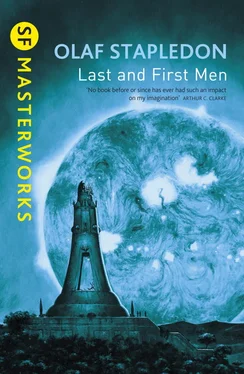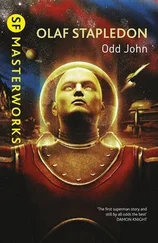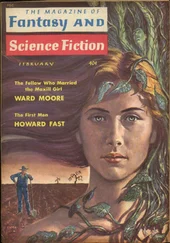Olaf Stapledon - Last and First Men
Здесь есть возможность читать онлайн «Olaf Stapledon - Last and First Men» весь текст электронной книги совершенно бесплатно (целиком полную версию без сокращений). В некоторых случаях можно слушать аудио, скачать через торрент в формате fb2 и присутствует краткое содержание. Город: London, Год выпуска: 1999, ISBN: 1999, Издательство: Orion Publishing Group, Жанр: Фантастика и фэнтези, на английском языке. Описание произведения, (предисловие) а так же отзывы посетителей доступны на портале библиотеки ЛибКат.
- Название:Last and First Men
- Автор:
- Издательство:Orion Publishing Group
- Жанр:
- Год:1999
- Город:London
- ISBN:978-1-857-98806-2
- Рейтинг книги:3 / 5. Голосов: 1
-
Избранное:Добавить в избранное
- Отзывы:
-
Ваша оценка:
- 60
- 1
- 2
- 3
- 4
- 5
Last and First Men: краткое содержание, описание и аннотация
Предлагаем к чтению аннотацию, описание, краткое содержание или предисловие (зависит от того, что написал сам автор книги «Last and First Men»). Если вы не нашли необходимую информацию о книге — напишите в комментариях, мы постараемся отыскать её.
is full of pioneering speculations about evolution, terraforming, genetic engineering and many other subjects.
Last and First Men — читать онлайн бесплатно полную книгу (весь текст) целиком
Ниже представлен текст книги, разбитый по страницам. Система сохранения места последней прочитанной страницы, позволяет с удобством читать онлайн бесплатно книгу «Last and First Men», без необходимости каждый раз заново искать на чём Вы остановились. Поставьте закладку, и сможете в любой момент перейти на страницу, на которой закончили чтение.
Интервал:
Закладка:
These two faiths were at one in their respect for crude physical movement. And here lay the deepest difference between the American and the Chinese minds. For the former, activity, any sort of activity, was an end in itself; for the latter, activity was but a progress toward the true end, which was rest, and peace of mind. Action was to be undertaken only when equilibrium was disturbed. And in this respect China was at one with India. Both preferred contemplation to action.
Thus in China and India the passion for wealth was less potent than in America. Wealth was the power to set things and people in motion; and in America, therefore, wealth came to be frankly regarded as the breath of God, the divine spirit immanent in man. God was the supreme Boss, the universal Employer. His wisdom was conceived as a stupendous efficiency, his love as munificence towards his employees. The parable of the talents was made the corner-stone of education; and to be wealthy, therefore, was to be respected as one of God’s chief agents. The typical American man of big business was one who, in the midst of a show of luxury, was at heart ascetic. He valued his splendour only because it advertised to all men that he was of the elect. The typical Chinese wealthy man was one who savoured his luxury with a delicate and lingering palate, and was seldom tempted to sacrifice it to the barren lust of power.
On the other hand, since American culture was wholly concerned with the values of the individual life, it was more sensitive than the Chinese with regard to the well-being of humble individuals. Therefore industrial conditions were far better under American than under Chinese capitalism. And in China both kinds of capitalism existed side by side. There were American factories in which the Chinese operatives thrived on the American system, and there were Chinese factories in which the operatives were by comparison abject wage-slaves. The fact that many Chinese industrial workers could not afford to keep a motor-car, let alone an aeroplane, was a source of much self-righteous indignation amongst American employers. And the fact that this fact did not cause a revolution in China, and that Chinese employers were able to procure plenty of labour in spite of the better conditions in American factories, was a source of perplexity. But in truth what the average Chinese worker wanted was not symbolical selfassertion through the control of privately owned machines, but security of life, and irresponsible leisure. In the earlier phase of “modern” China there had indeed been serious explosions of class hatred. Almost every one of the great Chinese industrial centres had, at some point in its career, massacred its employers, and declared itself an independent communist city-state. But communism was alien to China, and none of these experiments was permanently successful. Latterly, when the rule of the Nationalist Party had become secure, and the worst industrial evils had been abolished, class feeling had given place to a patriotic loathing of American interference and American hustle, and those who worked under American employers were often called traitors.
The Nationalist Party was not, indeed, the soul of China; but it was, so to speak, the central nervous system, within which the soul presided as a controlling principle. The Party was an intensely practical yet idealistic organization, half civil service, half religious order, though violently opposed to every kind of religion. Modelled originally on the Boishevic Party of Russia, it had also drawn inspiration from the native and literary civil service of old China, and even from the tradition of administrative integrity which had been the best, the sole, contribution of British Imperialism to the East. Thus, by a route of its own, the Party had approached the ideal of the Platonic governors. In order to be admitted to the Party, it was necessary to do two things, to pass a very strict written examination on Western and Chinese social theory, and to come through a five years’ apprenticeship in actual administrative work. Outside the Party, China was still extremely corrupt; for peculation and nepotism were not censured, so long as they were kept decently hidden. But the Party set a brilliant example of self-oblivious devotion; and this unheard-of honesty was one source of its power. It was universally recognized that the Party man was genuinely interested in social rather than private matters; and consequently he was trusted. The supreme object of his loyalty was not the Party, but China, not indeed the mass of Chinese individuals, whom he regarded with almost the same nonchalance as he regarded himself, but the corporate unity and culture of the race.
The whole executive power in China was now in the hands of members of the Party, and the final legislative authority was the Assembly of Party Delegates. Between these two institutions stood the President. Sometimes no more than chairman of the Executive Committee, this individual was now and then almost a dictator, combining in himself the attributes of Prime Minister, Emperor, and Pope. For the head of the Party was the head of the state; and like the ancient emperors, he became the symbolical object of ancestor worship.
The Party’s policy was dominated by the Chinese respect for culture. Just as Western states had been all too often organized under the will for military prestige, so the new China was organized under the will for prestige of culture. For this end the American state was reviled as the supreme example of barbarian vulgarity; and so patriotism was drawn in to strengthen the cultural policy of the Party. It was boasted that, while indeed in America every man and woman might hope to fight a way to material wealth, in China every intelligent person could actually enjoy the cultural wealth of the race. The economic policy of the Party was based on the principle of affording to all workers security of livelihood and full educational opportunity. (In American eyes, however, the livelihood thus secured was scarcely fit for beasts, and the education provided was out of date and irreligious.) The Party took good care to gather into itself all the best of every social class, and also to encourage in the unintelligent masses a respect for learning, and the illusion that they themselves shared to some extent in the national culture.
But in truth this culture, which the common people so venerated in their superiors and mimicked in their own lives, was scarcely less superficial than the cult of power against which it was pitted. For it was almost wholly a cult of social rectitude and textual learning; not so much of the merely litçrary learning which had obsessed ancient China, as of the vast corpus of contemporary scientific dogma, and above all of pure mathematics. In old days the candidate for office had to show minute but uncritical knowledge of classical writers; now he had to give proof of a no less barren agility in describing the established formula of physics, biology, psychology, and more particularly of economics and social theory. And though never encouraged to puzzle over the philosophical basis of mathematics, he was expected to be familiar with the intricacy of at least one branch of that vast game of skill. So great was the mass of information forced upon the student, that he had no time to think of the mutual implications of the various branches of his knowledge.
Yet there was a soul in China. And in this elusive soul of China the one hope of the First Men now lay. Scattered throughout the Party was a minority of original minds, who were its source of inspiration and the growing point of the human spirit in this period. \VeIl aware of man’s littleness, these thinkers regarded him none the less as the crown of the universe. On the basis of a positivistic and rather perfunctory metaphysic, they built a social ideal and a theory of art. Indeed, in the practice and appreciation of art they saw man’s highest achievement. Pessimistic about the remote future of the race, and contemptuous of American evangelism, they accepted as the end of living the creation of an intricately unified pattern of human lives set in a fair environment. Society, the supreme work of art (so they put it), is a delicate and perishable texture of human intercourse. They even entertained the possibility that in the last resort, not only the individual’s life, but the whole career of the race, might be tragic, and to be valued according to the standards of tragic art. Contrasting their own spirit with that of the Americans, one of them had said, “America, a backward youth in a playroom equipped with luxury and electric power, pretends that his mechanical toy moves the world. China, a gentleman walking in his garden in the evening, admires the fragrance and the order all the more because in the air is the first nip of winter, and in his ear rumour of the irresistible barbarian.”
Читать дальшеИнтервал:
Закладка:
Похожие книги на «Last and First Men»
Представляем Вашему вниманию похожие книги на «Last and First Men» списком для выбора. Мы отобрали схожую по названию и смыслу литературу в надежде предоставить читателям больше вариантов отыскать новые, интересные, ещё непрочитанные произведения.
Обсуждение, отзывы о книге «Last and First Men» и просто собственные мнения читателей. Оставьте ваши комментарии, напишите, что Вы думаете о произведении, его смысле или главных героях. Укажите что конкретно понравилось, а что нет, и почему Вы так считаете.











